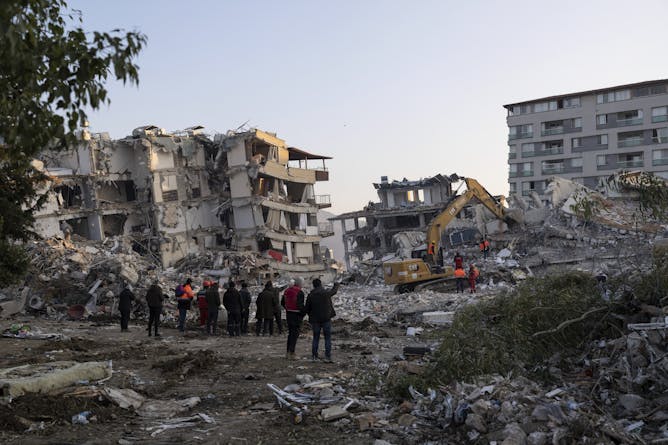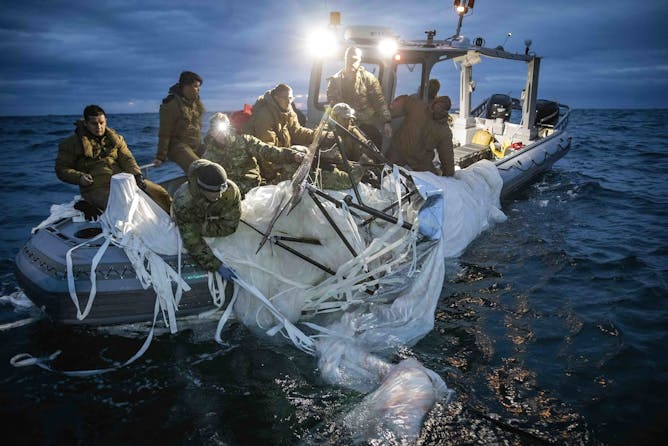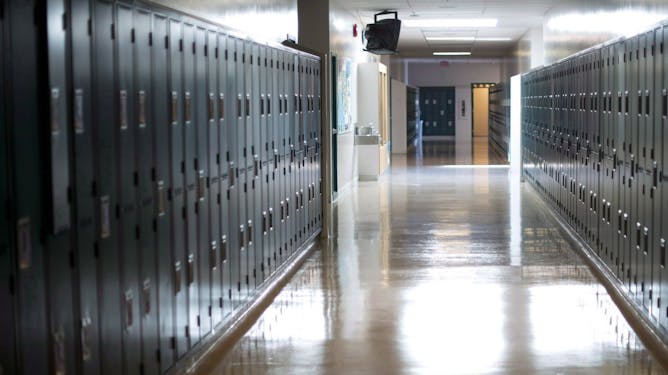|
Growing global urbanization, increasing density and changes in building materials have made search-and-rescue efforts after earthquakes a lot more challenging. After a disaster like the Turkey-Syria earthquake, it can take specialized teams days to reach a site, and local residents and emergency services take on the immediate rescue needs.
Today in The Conversation Canada, Ali Asgary at York University makes the case for long-term and sustained investment in urban search-and-rescue capacities, especially in earthquake-prone and densely populated areas. He also writes that blaming an earthquake for killing people “ignores the harsh reality that the buildings killed people,” and that proper building codes, regulations and materials are essential in saving lives.
Also today:
Regards,
|

Rescue workers continue to clear rubble from collapsed buildings in Antakya, Turkey, six days after two powerful earthquakes caused scores of buildings to collapse.
(AP Photo/Petros Giannakouris)
Ali Asgary, York University, Canada
The devastating outcomes of earthquakes is worsened when buildings cannot withstand the impact. Also, increased urban density and new construction materials are complicating search-and-rescue efforts.
|

In this photo provided by the U.S. navy, sailors recover a high-altitude surveillance balloon off the coast of Myrtle Beach, S.C., on Feb. 5, 2023. A missile was fired by a U.S. F-22 off the Carolina coast to bring the balloon down.
(U.S. Navy via AP)
Andrea Charron, University of Manitoba
If there’s any silver lining to the aerial objects being shot down over North America over the last few days, maybe it’s that North Americans will recognize and appreciate the binational NORAD.
|

Marriage has traditionally been touted as the goal to which everyone should strive, but remaining single is increasingly common.
(Pexels/Freestocksorg)
Simon Sherry, Dalhousie University
Valentine’s Day can be isolating for people who aren’t in romantic relationships. But research shows there are benefits to remaining single.
|

Wizards of the Coast’s Open Game License has allowed companies to build hugely successful franchises based on the Dungeons & Dragons tabletop role-playing game.
(Shutterstock)
Michael Iantorno, Concordia University
Recent events have forced fans to reconcile their love of Dungeons & Dragons with the reality that the game’s owner, Wizards of the Coast, is a large corporation with commercial interests at heart.
|

School choice policies have positioned schools as existing in a free market of schools, but parents and guardians have different amounts of ‘educational currency’ or privilege when choosing programs.
THE CANADIAN PRESS/Jonathan Hayward
Julie Chami Lindsay, University of Toronto
In a study, teachers who are parents acknowledged programs of choice separate students into cohorts labelled strong and weak, yet many continue to secure spots for their own children.
|

En plus de réduire l’impact des préjugés inconscients, le tirage au sort permet de rendre le processus d’évaluation des candidatures moins exigeant en temps et en ressources.
(Shutterstock)
Mirjam Fines-Neuschild, Concordia University
Adopter le tirage au sort dans l’octroi de financement de recherche maintient et même, augmente la qualité des projets financés.
|
Culture + Society
|
-
Tony Milligan, King's College London
Not all writing about the soulmate is positive – an expert in the philosophy of love explains the concept’s thorny history.
|
|
Environment + Energy
|
-
Christian Downie, Australian National University; Robert Brulle, Brown University
Researchers looked at a decade of political spending by the oil and gas industry and others engaged in climate policy. If money talks, one side had a giant megaphone.
|
|
Politics
|
-
Tope Shola Akinyetun, Lagos State University of Education
Young Nigerians actively discuss politics and governance despite being kept on the sidelines. They seek a government that would promote their inclusion and solve problems affecting them.
|
|